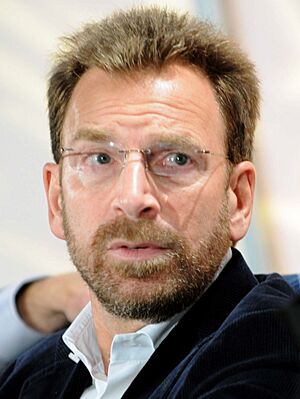Warner Music Group facts for kids

Logo used since November 2021
|
|

Headquarters in 1633 Broadway, New York City
|
|
|
Trade name
|
Warner Music Group |
|---|---|
|
Formerly
|
|
| Public | |
| Traded as |
|
| ISIN | [https://isin.toolforge.org/?language=en&isin=US9345502036 US9345502036] |
| Industry | |
| Founded | April 6, 1958 |
| Founder | Warner Bros. |
| Headquarters |
,
U.S.
|
|
Area served
|
Worldwide |
|
Key people
|
|
| Revenue | |
|
Operating income
|
|
| Total assets | |
| Total equity | |
| Owner | Access Industries (72% equity; 98% voting) |
|
Number of employees
|
5,800 (2024) |
| Divisions | List of Warner Music Group labels |
| Subsidiaries |
|
| Footnotes / references Financials as of September 30, 2024[update]. References: |
|
Warner Music Group Corp. (often called WMG) is a huge music and entertainment company based in New York City, USA. It's one of the "big three" record companies in the world, meaning it's one of the largest, along with Universal Music Group and Sony Music Entertainment.
WMG used to be owned by a bigger company called Time Warner. In 2004, Time Warner sold WMG to a group of private investors to help with its money issues. WMG was a public company (meaning its shares could be bought and sold by anyone) from 2005 to 2011. Then, a company called Access Industries bought WMG, making it a private company again. In 2020, WMG became a public company once more, with its shares traded on the Nasdaq stock exchange. Access Industries still owns most of the company and has most of the say in how it's run.
WMG earns billions of dollars each year and has over 5,800 employees. It operates in more than 50 countries around the world. The company owns many famous record labels, including Elektra Records, Reprise Records, Warner Records, Parlophone Records, and Atlantic Records. WMG also owns Warner Chappell Music, which is one of the biggest music publishers in the world.
Contents
- History of Warner Music Group
- Arts Music
- Music Publishing
- See also
History of Warner Music Group
Starting in the 1950s and 1960s
The film company Warner Bros. didn't have its own music label. But in 1957, one of their actors, Tab Hunter, had a number one song with a different record company. To make sure their actors recorded for them and to make money from music, Warner Bros. Records was started in 1958.
In 1963, Warner bought Reprise Records, which was started by Frank Sinatra. He wanted more creative control over his music. With this purchase, Warner gained Mo Ostin, who helped Warner/Reprise become very successful.
In 1967, Warner Bros. was sold to Seven Arts Productions. This new company then bought Atlantic Records, which was founded in 1947 and is WMG's oldest label. This deal brought famous artists like Neil Young into the company. Atlantic Records also had many classic songs by artists like Ray Charles and Aretha Franklin.
Atlantic Records, along with its partner Stax Records, became very important for Warner's growth. They released many famous soul music songs in the mid-1960s. Later, Atlantic also signed major rock and pop bands like Led Zeppelin and Cream.
In 1969, Elektra Records boss Jac Holzman suggested creating a joint system to distribute music for Warner, Elektra, and Atlantic.
Changes at Atlantic Records
By 1969, it became clear that Atlantic/Atco president Ahmet Ertegun and Warner/Reprise president Mike Maitland didn't get along. Ertegun worried that Maitland would have more power than him. He worked to secure his own position and remove Maitland.
In 1969, a company called Kinney National Company bought Warner Bros.-Seven Arts. Kinney National was a large company with interests in comics and other businesses. After the takeover, Warner's music group was briefly called Kinney Music. This was because of US laws that prevented the three labels (Warner, Elektra, Atlantic) from acting as one big company.
The head of Kinney, Steve Ross, focused on the movie division. He trusted the music label managers because they were making a lot of money. Ertegun continued his efforts against Maitland. In January 1970, Maitland was dismissed, and Mo Ostin became the new President of Warner Bros. Records. Joe Smith became his executive vice-president. Ertegun became the main leader of the Warner music division.
The 1970s: Growing Bigger
During the 1970s, the Kinney group became a very strong force in the music industry. In 1970, Kinney bought Elektra Records and its sister label Nonesuch Records for $10 million. This brought in popular rock acts like the Doors and a rich collection of folk and classical music.
Elektra's founder, Jac Holzman, ran the label for two years before moving to a new role, looking into new technologies. The same year, the company opened its first offices outside the US in Canada and Australia. Warner Bros. also started the Casablanca Records label, which later became independent.
Warner-Elektra-Atlantic (WEA) and Global Reach
After buying Elektra, the next step was to create their own system for distributing music for all their labels. This new system was first called Kinney Record Group International. By late 1972, US laws changed, and the company was renamed Warner-Elektra-Atlantic, or WEA for short. It was renamed Warner Music in 1991.
WEA was one of the first companies to support heavy metal music. Bands like Led Zeppelin, Black Sabbath, and Deep Purple were signed to WEA labels in the United States.
Before this, the Kinney record companies relied on other companies in different countries to make, distribute, and promote their music. Now, they started opening their own offices around the world, starting with Australia in 1970, then the UK, Europe, and Japan. In July 1971, the new distribution company was officially named Warner-Elektra-Atlantic Distributing Corp. (WEA).
In April 1971, the Kinney group made a big deal by getting the worldwide rights to the Rolling Stones' new label, Rolling Stones Records.
One of Kinney's best investments was Fleetwood Mac. The band signed with Reprise in the early 1970s. After moving to Warner Bros. in 1975 and adding new members Lindsey Buckingham and Stevie Nicks, the group became hugely successful with hit songs and albums like Rumours.
Warner Communications (1972–1990)
Because of a money scandal in its parking business, Kinney National separated its non-entertainment businesses in 1972 and changed its name to Warner Communications Inc..
In 1972, the Warner group bought David Geffen's Asylum Records for $7 million. This brought in important artists like Linda Ronstadt, the Eagles, and Joni Mitchell.
New artists signed in the late 1970s put WEA in a strong position for the 1980s. A deal with Seymour Stein's Sire Records label brought in punk rock and new wave acts like the Ramones and Talking Heads, and most importantly, the rising star Madonna. Elektra signed the Cars, and Warner Bros. signed Prince, giving WEA some of the biggest-selling artists of the decade.
WEA's labels also distributed music for other independent labels, like Geffen Records and Island Records.
The 1980s: Digital Steps and Mergers
In 1982, WEA International Inc. was created to handle the distribution of all Warner Bros., Elektra, and Atlantic releases for countries outside the US.
In 1987, Warner bought Chappell Music for US$275 million, which was a big music publishing company.
In 1976, Warner got an early lead in digital media by buying the Atari computer company. Warner also helped create MTV, the music television channel, which it co-owned with American Express. However, by 1984, Warner sold off many of these new businesses, including Atari and MTV Networks. This was partly due to the 1983 video game crash, which affected Atari's profits.
In 1989, Warner Communications merged with Time Inc. to form Time Warner. This deal was completed in 1990. After the merger, WEA continued to buy independent labels around the world. WEA was renamed Warner Music in 1991.
The 1990s: Big Changes and Challenges
Throughout the 1990s, Time Warner was the largest media company in the world. By 1991, Warner's music labels were making over US$3 billion in sales. By 1995, its music division was the biggest in the US.
Atlantic Records started two new labels in the early 1990s: East West Records and Interscope Records.
In 1992, Warner Music faced a big public relations problem because of a song called "... Killer" by the band Body Count. The song caused a lot of controversy, and many people, including politicians, criticized Warner for releasing it. Even though the artist later reissued the album without the song, the issue caused a lot of trouble for Warner Music.
Also in 1992, the Rhino Records label signed a deal with Atlantic Records. Time Warner Entertainment bought half of Rhino Records. This allowed Rhino to start reissuing old recordings from Atlantic's collection.
In 1994, a company called Seagram bought a part of Time Warner. Warner's publishing division, now called Warner/Chappell Music, became the world's largest owner of song copyrights.
The death of Steve Ross, the head of Time Warner, led to many changes and power struggles within the music group in 1994–95. This caused several important executives to leave the company.
By the mid-1990s, Interscope Records became a problem for the Warner group. Time Warner had already faced criticism over the "... Killer" song, and now they were criticized again for the gangsta rap music released by Interscope's partner label, Death Row Records. In 1995, Time Warner sold its share in Interscope.
These changes at Warner benefited its rivals, who hired many of the executives who left Warner. In 1995, Robert A. Daly and Terry Semel took over running the music division.
In 1998, Time Warner Entertainment bought the rest of the Rhino Records label. Rhino then started reissuing old music from the Warner/Reprise and Elektra/Asylum labels.
The 2000s: New Ownership and Digital Growth
In 2000, Time Warner Entertainment merged with the internet company AOL to create AOL Time Warner. However, this merger didn't work out as planned, and AOL's profits dropped. So, Time Warner later dropped "AOL" from its name.
In 2004, to reduce its debt, TimeWarner sold Warner Music Group to a group of investors led by Edgar Bronfman Jr. for US$2.6 billion. This made WMG an independent company. WMG also got a license to use the old Warner Bros. shield logo for 15 years. When that license ended in 2019, Warner Bros. Records changed its name to Warner Records and got a new logo.
WMG started cutting costs by selling off parts of the company that weren't making much money. For example, they sold their disc-pressing plants. In 2005, Warner Bros. Publications, which printed sheet music, was sold to Alfred Music Publishing.
In 2006, WMG turned down an offer to be bought by EMI. Later, WMG offered to buy EMI, but that offer was also rejected. WMG later acquired Rykodisc and Roadrunner Records.
In September 2006, WMG made a new deal with YouTube. This deal allowed WMG to sell ads on its artists' music videos and share in the money earned from user-created videos that used WMG's music.
In 2007, Warner announced that it would sell digital music without digital rights management (DRM) through AmazonMP3. This meant people could buy music files that weren't restricted by copy protection. In 2008, WMG's Atlantic Records became the first major record label to earn more than half of its music sales in the US from digital products.
In 2008, WMG and other major labels invested in the new music streaming service Spotify.
The 2010s: New Ownership and Expansion
In May 2011, WMG announced it was being sold to Access Industries, a large company owned by billionaire Len Blavatnik, for US$3.3 billion. The purchase was completed on July 20, 2011, and WMG became a private company again. In August 2011, Stephen Cooper became the CEO of Warner Music Group.
Buying and Selling EMI Labels
In 2013, Warner bought the famous Parlophone label, along with EMI Classics and some other EMI operations, from Universal Music Group for about $764.54 million US. This happened after Universal bought most of EMI's music business. The EMI Classics artists joined Warner Classics.
To make sure there was fair competition, WMG agreed to sell off over $200 million worth of music catalogs to independent labels. This meant that many artists' old music rights were transferred to smaller companies. For example, in 2016, the band Radiohead's old music catalog was sold to XL Recordings.
Growing Bigger
In October 2012, WMG signed a deal with Google's music service. It was also one of the last major labels to reach an agreement with Spotify.
In June 2013, WMG expanded into Russia by buying Gala Records. Later that year, Warner Music Russia agreed to distribute music from Disney Music Group and Sony Music in Russia. WMG also made a deal with Clear Channel Media (now iHeartMedia) that allowed its artists to be paid for their songs played on traditional radio for the first time.
In 2017, WMG started a TV and film division called Warner Music Entertainment. In February 2022, Warner announced it bought a major share in Divo Music, a distribution label based in South India.
International Growth
In November 2013, Warner Music's releases in the Middle East began to be distributed by Universal Music. Sony Music India took over distribution for WMG in India and other nearby countries. In December 2013, Warner Music started its own company in South Africa. In April 2014, WMG announced it had bought the Chinese record label Gold Typhoon.
In April 2016, WMG agreed to distribute most of BMG Rights Management's music around the world through Warner's ADA division.
In September 2017, WMG bought the Dutch electronic dance music (EDM) label Spinnin' Records. In February 2018, Warner Music opened a new division in the Middle East, based in Beirut, Lebanon.
In January 2019, WMG signed a deal with Doğan Media Group in Turkey for physical and digital music releases. In May 2019, Warner Music Finland bought the hip-hop label Monsp Records. In July 2019, Warner Music Slovakia bought Forza Music, which owned the old state-owned label Opus Records. In February 2021, WMG bought a small part of the Saudi Arabian record label Rotana Records.
Elektra Music Group and Other Investments
In July 2017, Warner Music bought the concert discovery website Songkick.
On October 1, 2018, Warner Music Group launched Elektra Music Group. This new group included labels like Elektra Records, Fueled By Ramen, and Roadrunner Records. This brought back the idea of the Warner-Elektra-Atlantic (WEA) group that had been part of the company for many years.
In August 2018, Warner Music announced it bought Uproxx Media Group, a media company. In September 2018, WMG bought the German merchandise retailer EMP Merchandising.
In October 2018, Warner Music Group started a new fund called WMG Boost to invest in new music businesses. In 2019, several Warner Music labels moved into a former car factory in the Los Angeles Arts District.
The 2020s: Digital Focus and New Partnerships
On March 9, 2020, WMG expanded into India, creating a new unit called Warner Music India in Mumbai.
In August 2020, Warner Music bought IMGN Media, a company that creates online content. In September 2020, WMG bought the online hip-hop magazine HipHopDX. In 2021, WMG invested a lot of money into the online gaming platform Roblox.
On June 3, 2020, WMG completed its IPO on Nasdaq, raising almost $2 billion. This made WMG a public company again. On June 12, 2020, Tencent, a Chinese company, bought a part of Warner Music's shares.
In December 2020, WMG signed a partnership deal with TikTok to provide music for users to use in their videos.
In January 2023, Robert Kyncl became the new CEO of WMG, taking over from Stephen Cooper.
In July 2023, Warner Music Group partnered with Canva, a graphic design platform, to add commercial music to Canva's library. Also in July 2023, WMG made another music-licensing deal with TikTok.
In September 2023, WMG opened a new creative hub in Berlin, Germany. In October 2023, Warner Music Group launched another new creative hub in Amsterdam, Netherlands.
Arts Music
On June 6, 2017, Warner Music Group started a new division called Arts Music, Inc. This division focuses on music that is not mainstream pop. It includes labels for classical music, jazz, children's music, and music from films and musicals.
In November 2018, Arts Music signed a deal with Sesame Workshop to bring back the Sesame Street Records label. In June 2019, WMG bought First Night Record, a company that records musical theater cast albums, and placed it within Arts Music.
On May 1, 2020, the toy company Mattel made a deal with Arts Music to be the only distributor of its music. This meant hundreds of new and old songs from Mattel brands like Thomas & Friends would be available digitally.
Music Publishing
Warner Chappell Music has a very long history, going back to 1811 with Chappell & Company in London. In 1929, Jack L. Warner, the president of Warner Bros. Pictures, started Music Publishers Holding Company (MPHC) to get music rights for films. In 1987, Warner Communications bought Chappell & Company.
Warner Chappell Music controls the publishing rights for many famous songs, including works by Cole Porter.
See also
 In Spanish: Warner Music Group para niños
In Spanish: Warner Music Group para niños
- List of record labels
- List of Warner Music Group artists
- List of Warner Music Group labels
 | Roy Wilkins |
 | John Lewis |
 | Linda Carol Brown |




